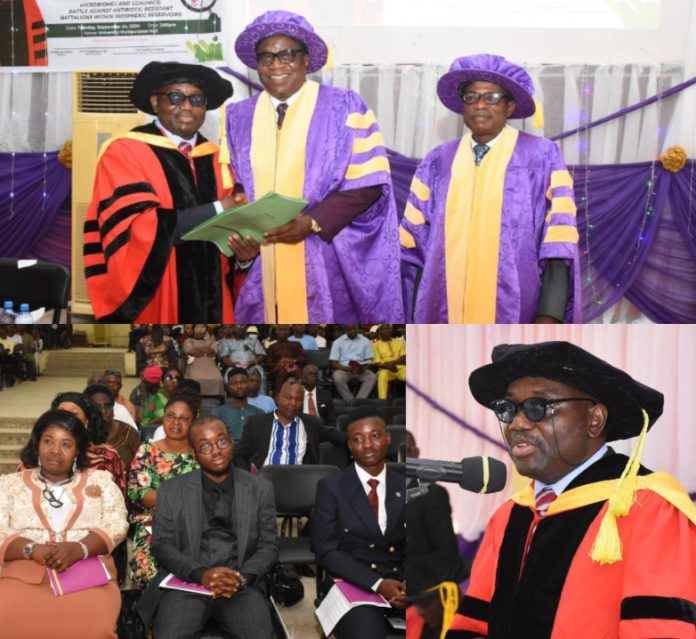
A renowned microbiologist, Prof. Adedayo Ajayi, has raised the alarm over the increasing threat of antibiotic-resistant bacteria, warning that the proliferation of these “superbugs” poses a serious risk to human health and the environment.
Prof. Ajayi issued this warning on Tuesday, September 24, 2024, while delivering the 28th Inaugural Lecture of Adekunle Ajasin University, Akungba Akoko, titled Microbiomes and Genomics: Battle Against Antibiotic Resistant Battalions within Biospheric Reservoirs.
He explained the critical role of microbiomescomplex communities of microorganisms such as bacteria, fungi, and viruses that naturally inhabit various environments, including the human body, water bodies, and soil.
Prof. Ajayi called for a comprehensive “One Health” approach that integrates human, animal, and environmental health in order to combat the rise of antimicrobial resistance.
He emphasized that understanding the genomic information of these microorganisms is crucial for identifying microbial species and functions, which can help in developing targeted therapies to combat infections.
“The microbiomes not only influence ecosystem balance but also human health safety. Genomic data allows us to understand microbial species better, trace their evolution, and devise strategies to control infections,” Prof. Ajayi stated.
Prof. Ajayi described antibiotic-resistant microbes, which he referred to as “microbial battalions,” as a significant and growing challenge in both healthcare and environmental safety. These battalions, also known as superbugs, are resistant to most available antibiotics and can multiply at alarming rates, forming colonies that are difficult to treat.
“These microbial battalions can replicate in millions per hour and trillions in days, depending on the species or pathogenic agent,” he explained, adding that the unchecked spread of these superbugs is deleterious to human survival.
Prof. Ajayi explained that, “resistance to antibiotics occurs over time through genetic changes in pathogens, but its spread is driven by human activities, particularly the misuse and overuse of antimicrobials in treating infections across humans, animals, and plants, stressing the need for public campaigns to raise awareness and curb drug abuse, misuse, and addiction.
He emphasized the need for equitable distribution of healthcare services, noting that all citizens must have access to healthcare facilities and amenities capable of addressing public health challenges.
There is a need to put in place structures that can enhance equity and justice. Health services and amenities that make life more bearable must reach all the nooks and crannies of the country. We all have roles to play, especially in adopting a ‘One Health’ approach to mitigate the surge of antimicrobial resistance,” he urged.
The One Health approach enhances disease prevention, early detection, and response by monitoring and controlling health risks across multiple sectors. It addresses environmental factors that impact human health and promotes responsible antibiotic use, the development of new treatments, and environmental stewardship, Prof. Ajayi explained.
According to him, the approach, in Nigeria, and globally, has proven effective in the control of diseases such as Tuberculosis, Malaria, pandemic influenza, COVID-19, Ebola, Brucellosis, and HIV/AIDS.
To effectively implement the One Health approach, Prof. Ajayi called for the involvement of several key stakeholders, including research and development institutions, national health platforms, international partnerships (e.g., WHO, OIE, FAO), community engagement programmes, and policy advocacy.
The Professor of microbiology urged the academic community and the public to continue working towards sustainable solutions that integrate human, environmental, and animal health.
Earlier, while introducing the Inaugural Lecturer, the Chairman on the occasion and Vice Chancellor, Prof. Olugbenga Ige, noted that inaugural lectures are opportunities for professors to share their research findings and ideas for the benefit of society and to propose solutions to societal needs.
He acknowledged the Lecturer as a distinguished scholar whose wealth of experience would undoubtedly benefit society.















